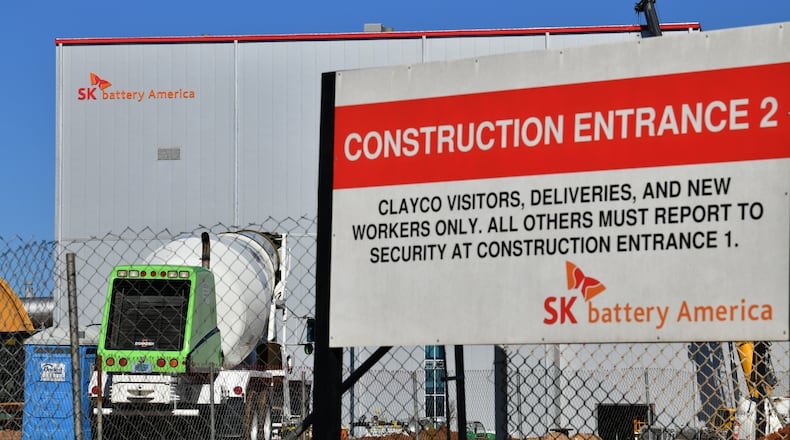Big changes are coming to the auto industry.
Right now, only 3% of all vehicles worldwide are powered by electricity, according to the International Energy Agency. But by 2030, according to one estimate, the number of electric vehicles will climb from 8.5 million to 116 million, accounting for about 60% of all passenger vehicle miles traveled worldwide.
And Georgia is poised to be a major player in the United States’ growing electric vehicle industry, economic development officials say.
Next year, a multibillion dollar electric vehicle battery factory is set to begin production near Commerce, just north of Atlanta. And already, the SK Battery America plant, which recently reached a settlement with a rival that had accused it of stealing trade secrets, has attracted some suppliers, including GEDIA Automotive Group in Dalton, Teklas in Calhoun and EnChem in Commerce.
More may be on the way. The state is in talks with other companies as it works to create an electric vehicle, or EV, ecosystem, said Pat Wilson, Georgia’s economic development commissioner.
Wilson said the companies are involved in everything from making cathodes — the terminal on a battery that transmits electrical current — to recycling raw materials in old batteries, like graphite, which can be used to make new batteries. He declined to identify the companies.
SK already has reached an agreement to supply EV batteries to the Volkswagen plant in Chattanooga and a Ford plant in Rawsonville, Michigan.
No single state or U.S. region dominates the EV sector in the way that Detroit and the Midwest once did for gas-powered cars and trucks. So, Georgia could get its foot in the door early in an emerging industry.
“Georgia is in a great place right now,” said Eric Tanenblatt, global chair of public policy and regulation at the law firm Dentons.
The trade publication Site Selection has ranked Georgia the top state in which to do business on multiple occasions. The award is based on factors like workforce training programs, ease of permitting and regulatory procedures.
Earlier this year, Georgia reportedly almost nabbed another major EV project. According to media reports, Apple held talks with Kia in February about manufacturing its proposed electric car at its factory in West Point, although the talks later ended for reasons that are unclear. Still, it’s a good sign that Georgia was in the conversation, Tanenblatt said.
The state has a proven track record in recruiting automotive companies, said Tom Harrold, an economic development lawyer at Miller & Martin.
Georgia’s central geographic location is one of the state’s main strengths, according to Site Selection magazine. EV suppliers can open facilities in Georgia and be conveniently located near Mercedes-Benz in Alabama, BMW in South Carolina and Volkswagen in Tennessee. All are expected to eventually convert at least a portion of their factories to EVs.
“It’s like the old real estate mantra — location, location, location,” Harrold said.
Georgia has the necessary infrastructure to handle distribution of EV parts, such as the Port of Savannah and its rail and trucking connections. said David Clayton, executive director of Clemson University’s International Center for Automotive Research.
Electric vehicles are heavier than gas vehicles because of the massive weight of their batteries, Clayton said. To save on shipping costs, many companies in the EV ecosystem will want to locate close to the battery plants, he said.
“You’d rather not ship a very heavy, hazardous material like an EV battery any farther than you have to,” he said.
Georgia has shown it’s willing to provide rich economic incentive packages in recruiting wars. The state gave SK about $300 million in grants, tax breaks and free land. Some have criticized Georgia’s incentives as too generous for corporations. But they’re essential if the state wants to win new projects, Harrold said.
Even so, other states are likely to submit aggressive bids, too, and may outbid Georgia to win projects, according to Site Selection. Alabama, South Carolina and Tennessee already have large automotive industries. Midwestern states like Michigan and Ohio will want to maintain their historic roles in the auto sector. And the biggest EV company, Tesla, is headquartered in California.
Georgia will focus on recruiting more companies that supply parts to batteries, such as those that process rare earth metals that are essential to battery operations, Wilson said.
“We’re mining rare earth metals in Jesup in southeast Georgia, but the rare earths are going to Estonia and China to be processed,” he said. “We need that here in Georgia.”
Software also is essential in operating an electric vehicle and the state will rely on Georgia Tech’s prominent position as an innovator to bolster recruiting, Wilson said.
“The software is the brains of the battery management system and regulates things like its temperature,” said Lea Malloy, head of research and development at Cox Automotive Mobility.
Additionally, Georgia should target companies that recycle battery materials for use in new battery production, Harrold said. Germany’s Duesenfeld and Japan’s Mitsubishi are leaders in battery recycling and should be priority recruiting targets, he said.
EVs provide a rare opportunity for Georgia to develop a new economic sector from scratch. But it has no time to waste, Wilson said.
“People are waking up to this wave of change in the auto industry,” Wilson said.
About the Author
Keep Reading
The Latest
Featured



